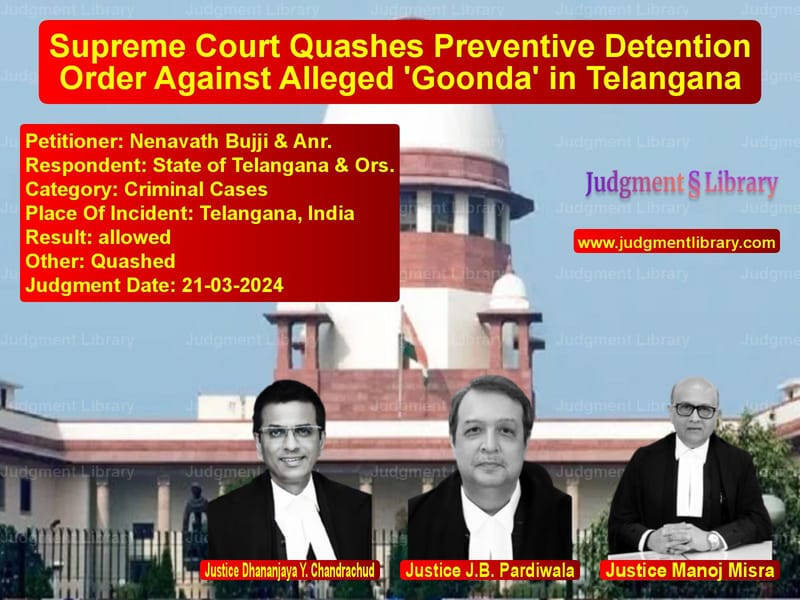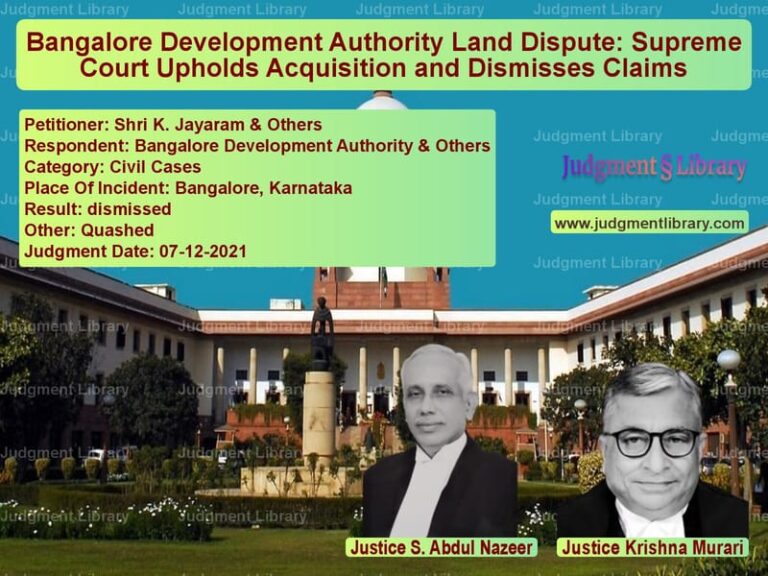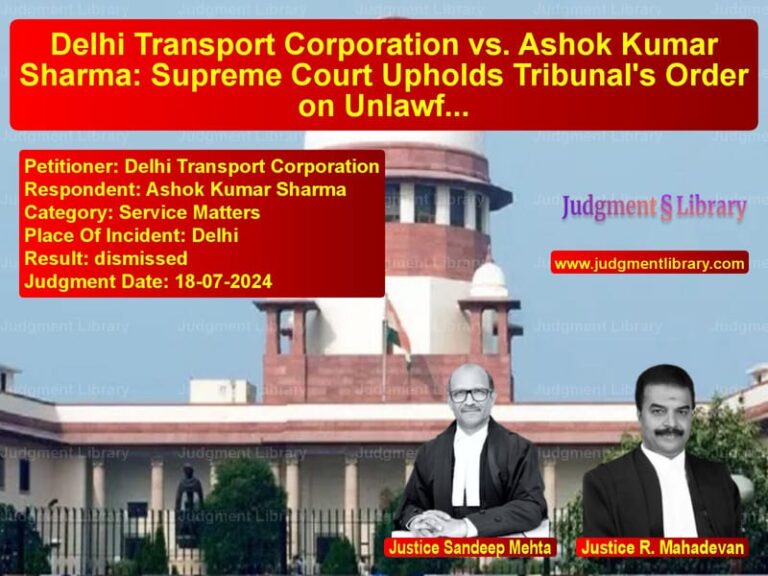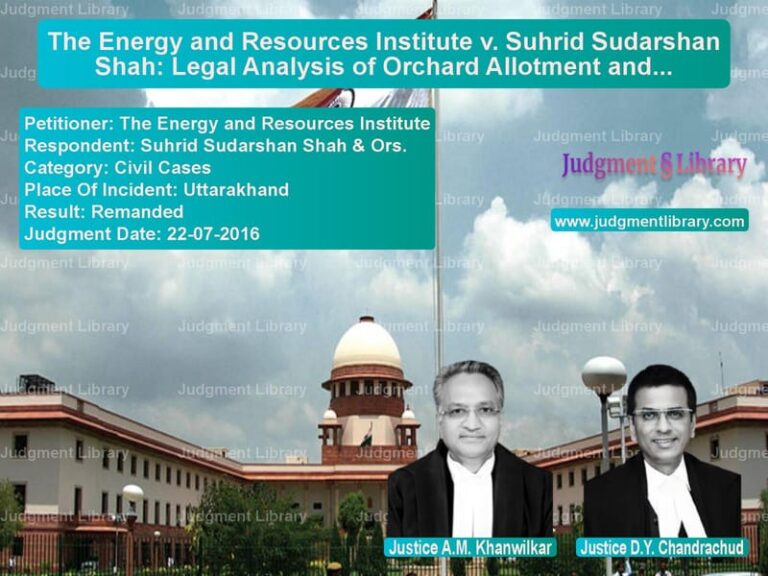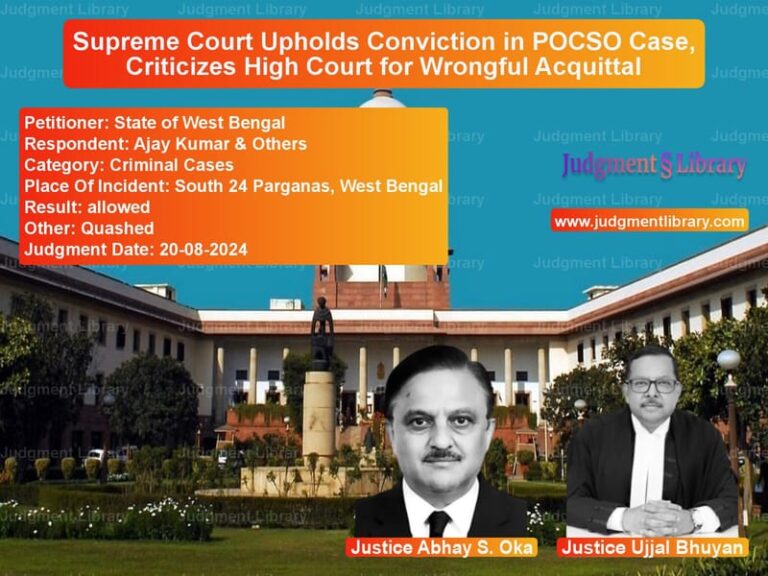Supreme Court Quashes Preventive Detention Order Against Alleged ‘Goonda’ in Telangana
The Supreme Court of India recently set aside a preventive detention order in the case of Nenavath Bujji & Anr. v. State of Telangana & Ors., ruling that the detention of the appellant under the Telangana Prevention of Dangerous Activities Act, 1986, lacked justification. The Court held that habitual criminality alone does not warrant preventive detention unless public order is directly threatened.
Background of the Case
The appellant, Nenavath Bujji, was detained under Section 3(2) of the Telangana Prevention of Dangerous Activities Act, 1986, on the ground that he was a habitual offender engaged in robberies and chain snatching. The Commissioner of Police, Rachakonda, issued the detention order on September 12, 2023, claiming that the appellant’s activities created widespread fear and disturbed public order.
The detention order cited multiple criminal cases, including:
- Cr. No. 39/2023 under Section 394 IPC (Robbery) of Madgul Police Station
- Cr. No. 107/2023 under Section 392 IPC (Theft) of Madgul Police Station
According to the police, the appellant, along with his associates, committed these offenses in broad daylight, snatching gold chains from women and instilling fear in the community.
High Court’s Decision
The Telangana High Court dismissed the appellant’s habeas corpus petition, ruling that the detention order was justified based on the seriousness of the offenses and their impact on public order. The High Court emphasized that the crimes created widespread panic among women, making preventive detention necessary.
Read also: https://judgmentlibrary.com/supreme-court-acquits-man-in-alleged-rape-case-citing-lack-of-evidence/
Petitioners’ Arguments
Senior Advocate P. Mohith Rao, representing the appellant, raised the following key arguments:
- Mere registration of FIRs for offenses under Chapter XVII of the IPC (dealing with crimes against property) does not automatically justify labeling an individual as a ‘goonda’ under Section 2(g) of the Act.
- The detention order was based only on two FIRs within the Rachakonda Commissionerate, while ignoring two other FIRs outside its jurisdiction.
- There was no material to show that the appellant’s actions had caused widespread fear or insecurity beyond localized criminal acts.
- The proper legal recourse for repeat offenses should have been applying for bail cancellation rather than invoking preventive detention.
- Reliance on the accused’s confessional statement to the police was unlawful, as such statements are inadmissible.
Respondents’ Arguments
The Telangana government defended the detention, arguing:
- The appellant’s repeated involvement in chain snatching created an atmosphere of panic and alarm.
- The detention order was based on material evidence, including FIRs, witness statements, CCTV footage, and police reports.
- The preventive detention order was necessary as the appellant had a history of securing bail and continuing criminal activities.
Supreme Court’s Observations
The Supreme Court analyzed whether the preventive detention order met legal standards under the Act. The key findings were:
- Distinction between Law and Public Order: The Court reiterated that public order is disturbed when crimes affect the community at large, not merely when individual offenses are committed.
- Mere Criminality Does Not Justify Preventive Detention: The Court held that habitual commission of property-related crimes does not automatically threaten public order.
- Failure to Prove Public Alarm: The state failed to provide independent evidence, such as statements from affected citizens, to prove that the appellant’s actions led to widespread public fear.
- Confessional Statements Were Unreliable: The detention order relied heavily on the appellant’s police confessions, which are inadmissible.
- Alternative Remedies Were Available: Instead of resorting to preventive detention, the state should have sought bail cancellation if it believed the appellant was a repeat offender.
Key Judicial Remarks
The Supreme Court emphasized the importance of preventing misuse of preventive detention laws:
“The distinction between ‘law and order’ and ‘public order’ must be maintained. Preventive detention is not a substitute for regular criminal prosecution. It should be invoked only when activities directly threaten public safety and disrupt the even tempo of life.”
Addressing the reliance on prior criminal history, the Court stated:
“Merely branding someone as a ‘goonda’ based on past FIRs does not justify preventive detention. The state must demonstrate a direct link between the person’s actions and disruption of public order.”
On procedural lapses, the Court observed:
“The detaining authority must rely on objective material, not speculative concerns about future conduct. In this case, the lack of independent evidence beyond police reports raises serious doubts about the necessity of preventive detention.”
Final Judgment
The Supreme Court ruled:
- The High Court’s judgment was set aside.
- The preventive detention order was quashed.
- The appellant was ordered to be released immediately.
- The Telangana government was directed to ensure strict compliance with legal standards in future preventive detention cases.
Conclusion
This ruling reinforces the principle that preventive detention must be used sparingly and only when there is clear evidence of a direct threat to public order. It cautions against the routine branding of habitual offenders as ‘goondas’ and ensures that procedural safeguards are upheld.
Read also: https://judgmentlibrary.com/cbi-vs-r-c-sabharwal-supreme-court-rejects-discharge-in-corruption-case/
Petitioner Name: Nenavath Bujji & Anr..Respondent Name: State of Telangana & Ors..Judgment By: Justice Dhananjaya Y. Chandrachud, Justice J.B. Pardiwala, Justice Manoj Misra.Place Of Incident: Telangana, India.Judgment Date: 21-03-2024.
Don’t miss out on the full details! Download the complete judgment in PDF format below and gain valuable insights instantly!
Download Judgment: nenavath-bujji-&-anr-vs-state-of-telangana-&-supreme-court-of-india-judgment-dated-21-03-2024.pdf
Directly Download Judgment: Directly download this Judgment
See all petitions in Bail and Anticipatory Bail
See all petitions in Public Interest Litigation
See all petitions in Legal Malpractice
See all petitions in Judgment by Dhananjaya Y Chandrachud
See all petitions in Judgment by J.B. Pardiwala
See all petitions in Judgment by Manoj Misra
See all petitions in allowed
See all petitions in Quashed
See all petitions in supreme court of India judgments March 2024
See all petitions in 2024 judgments
See all posts in Criminal Cases Category
See all allowed petitions in Criminal Cases Category
See all Dismissed petitions in Criminal Cases Category
See all partially allowed petitions in Criminal Cases Category

